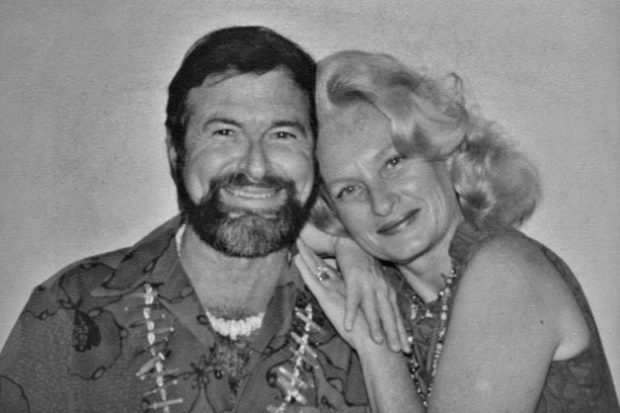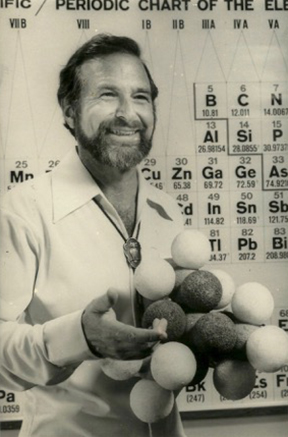
Courtesy of the Kauffman family
(Editor’s note: With great sadness, the Community Alliance announces the passing of Dr. George Kauffman, a longtime contributor with dozens of scientific book reviews. He will be missed. We thank the Kauffman family for the following obituary and the photos. Please find below the last book review written by Dr. Kauffman for Community Alliance, “A Feast of Science.”
May Dr. Kauffman rest in peace).
George Bernard Kauffman, who was a professor of chemistry at Fresno State from 1956 until his retirement in 1992, died in his home in Fresno on May 2. Dr. Kauffman was born in Philadelphia on Sept. 4, 1930 to Philip Jack Kauffman and Laura Fisher.
Kauffman was a Science Talent Search winner in 1948 and received his B.A. with honors in chemistry from the University of Pennsylvania (1951) and his Ph.D. from the University of Florida (1956). He was a research participant at the Oak Ridge National Laboratory (1955), an instructor in chemistry at the University of Texas (1955–1956) and a research chemist for Humble Oil and Refining Company (1955) and General Electric Company (1957, 1959).
Long active in local and national American Chemical Society (ACS) affairs, he was chair (1969–1970), symposium chair (1966, 1968, 1970) and program chairman (1967–1969) of the ACS Division of the History of Chemistry. He was editor of the History of Chemistry Series, ACS Audio courses (1975–1981). He presented more than a hundred lectures at local, national and international meetings and symposia.
Dr. Kauffman authored 17 books and more than 3,000 papers, reviews and encyclopedia articles on chemical education, chemistry and the history of science, a number of which have been translated into foreign languages. In 1969, the USSR Academy of Sciences invited him to contribute two articles on relations between Mendeleev and American chemists to a volume celebrating the centenary of the periodic system. In 1971, he was invited to present a paper and preside at the 13th International Congress on the History of Science in Moscow. On both occasions, he was the only Western scientist to be so honored.
In 1972, he was named director of Fresno State’s National Science Foundation Undergraduate Research Participation Program. In that same year, he was named a Guggenheim fellow in the field of History of Science and Technology. In 1973, he was one of two faculty members chosen from among 16,000 in the 19-campus California State University System to be named Outstanding Professor in recognition of his “creative teaching and scholarly endeavor.”
Kauffman was a contributing editor for the Journal of College Science Teaching, The Hexagon, the Journal of Chemical Education, Today’s Chemist, The Chemical Intelligencer, Today’s Chemist at Work, Chemical Heritage, The Chemical Educator, Chem 13 News, Industrial Chemist and the CSUF Navigator. In 1976, he was one of four national winners of the Manufacturing Chemists’ Association Catalyst Award for Excellence in College Chemistry Teaching.
He was awarded all three of the N.S. Kurnakov Institute of General and Inorganic Chemistry, USSR Academy of Sciences medals—the Chugaev (1976), Kurnakov (1990) and Chernyaev medals (1991). He was a member of the editorial board of Polyhedron and editor of this journal’s quarterly feature “Historical Sketches” (1982–1985).
Kauffman made a chemical-historical study of Werner’s coordination theory under a National Science Foundation grant at the Universität Zürich (1963–1964). He spent 1983 in Europe under grants from the National Endowment for the Humanities and Svenska Institutet (the Swedish Institute) gathering material for his research project, “A Humanist Genius as Amateur Scientist: August Strindberg’s Chemical and Alchemical Studies and Their Influence on His Literary and Dramatic Productions.”
He received the Exceptional Merit Service Award (1984) and the Meritorious Performance and Professional Promise Award of the California State University System (1986 and 1988). He was awarded the Marc-Auguste Pictet Medal of the Société de Physique et d’Histoire Naturelle de Genève (1992) and the George C. Pimentel Award in Chemical Education (1993).
In 1994, Kauffman became the first recipient of the President’s Medal of Distinction, “the highest non-degree presented by CSUF to citizens of the region, state or nation whose contribution in the area of professional achievements or public service are of national or international significance, or represent a contribution of great significance to the university.”
He presented the introductory plenary lecture at the 17th Conference on Coordination Chemistry (“Coordination Chemistry at the Turn of the Century”), Smolenice Castle, Slovakia, June 7–11, 1999, and an invited paper at the Third International Conference on the History of Chemistry and Chemical Industry, Budapest, Hungary, July 2–4, 1999.
In 2000, he received the ACS Award for Research at an Undergraduate Institution. On the occasion of his 70th birthday, the Institute for the History of Science & Technology, Russian Academy of Sciences, honored him with a laudatory decree for his contributions to chemistry and the history of chemistry.
In 2002, he was elected a Fellow of the American Association for the Advancement of Science (AAAS), received the American Chemical Society’s Helen M. Free Award for Public Outreach and was honored by the ACS for his 50 years of service. His invited article, “Coordination Chemistry at the Turn of the Century,” appeared in a special issue of the Journal of the Indian Chemical Society (June 2003).
Kauffman is the author or editor of such important books as Alfred Werner—Founder of Coordination Chemistry (1966), Werner Centennial (Advances in Chemistry Series No. 62, 1967); Classics in Coordination Chemistry I. The Selected Papers of Alfred Werner (1968), II. Selected Papers 1798–1899 (1976), III. Twentieth Century Papers 1904–1935 (1978); Teaching in the History of Chemistry (1971); and Coordination Chemistry: A Century of Progress (ACS Symposium Series No. 565, 1994).
In 1978, Kauffman received the Dexter Award for extensive contributions including published papers and books, organization of symposia and particularly for his studies on Alfred Werner and the history of coordination compounds.
Over the years, Kauffman was a frequent contributor to the Fresno Bee and the Community Alliance newspaper, not only on topics related to science but also with reflections about experiences in his own life. In addition to his significant accomplishments in the field of chemistry, he was a music enthusiast and had a strong interest in the interactions of science, humans and the environment.

He had a unique sense of humor and displayed passionate engagement and diligence throughout his life. He is survived by his wife of 50 years, Laurie Kauffman, his children Ruth (Marty) Bryskier, Judith (Mario) Reposo, Bob (Peggy) Papazian, Teresa Papazian, Mary Papazian, eight grandchildren and five great grandchildren.
A reprint of his last review:
A Feast of Science
By George B. Kauffman
A Feast of Science: Intriguing Morsels from the Science of Everyday Life by Dr. Joe Schwarcz. ECW Press, 665 Gerrard St. East, Toronto, Canada M4M IY2, 2018, Paperback, $17.95, ISBN 978-1-77041-192.
Dr. Joe Schwarcz, Ph.D., is host for 38 years of the Montreal radio program The Dr. Joe Show, director of McGill University’s Office for Science and Society and author of 16 best-selling popular science books. Well known for his informative and entertaining lectures, Dr. Schwarcz’s book demystifies the chemistry of everyday life, serving up practical knowledge to both inform and entertain. He proves that “chemical” is not necessarily synonymous with “toxic.”
Are there fish genes in tomatoes? Can snail-slime cream and bone broth really make your wrinkles disappear? What’s the problem with sugar, resistant starch, hops in beer, microbeads and “secret” cancer cures? Are “natural” products the key to good health? What is “fake news” all about?
Dr. Schwarcz answers questions such as these and more.
*****
George B. Kauffman, Ph.D., chemistry professor emeritus at Fresno State and a Guggenheim Fellow, is a recipient of the American Chemical Society’s George C. Pimentel Award in Chemical Education, the Helen M. Free Award for Public Outreach and the Award for Research at an Undergraduate Institution, and numerous domestic and international honors. In 2002 and 2011, he was appointed a Fellow of the American Association for the Advancement of Science and the American Chemical Society, respectively.
